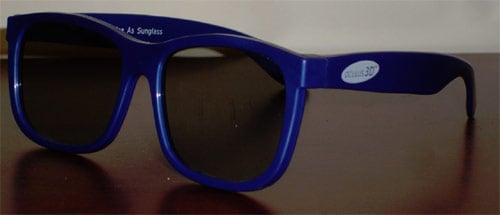Cereplast To Put Biodegradable 3D Glasses Into Cinemas
Just as companies are rushing out iPad accessories before the device even ships, Cereplast is hoping to make a splash with an eye-catching set of 3D glasses. No, these don't look much different than the RealD glasses you probably already own, but the tree hugging crowd will definitely find a lot to love with these. Cereplast has joined with Oculus3D to offer "bioplastic 3D glasses" in cinemas. Believe it or not, these are said to be the world’s first biodegradable/compostable 3D glasses, constructed using Cereplast's proprietary bio-based, sustainable plastic resins.
Both companies expect these glasses to be in theaters by the summer, and they're hoping that these will seriously cut down on waste. For example, around 10 million pairs of 3D glasses will be used just to watch Avatar and Alice in Wonderful; imagine all of those going to a landfill eventually. Cereplast would much rather these disposable products be made out of something that won't kill the Earth, and honestly we agree. Besides, who really cares if their 3D glasses are made out of some weird resin? Sounds like a win-win to us.

The current 3D glasses offered by movie theaters are made of traditional fossil fuel plastic and are not biodegradable. The CO2 emissions for the more than 10 million plastic glasses is equivalent to the harmful emissions generated by burning 50,000 gallons of gasoline or 917 barrels of oil. The Oculus3D eyewear will feature Cereplast’s Compostables® resin made with Ingeo® Poly-lactic acid (PLA). These resins allow for the manufacturing of glasses made of renewable material and create a truly compostable product. If discarded at a compost site, the 3D glasses will return to nature in less than 180 days with no chemical residues or toxicity left in the soil.
“We are very glad to be associated with Oculus3D, a company that understands and is concerned about the environmental impact associated with traditional petroleum-based plastic. Through the collaboration of our joint effort, we can offer the Hollywood community meaningful 'green' benefits requiring little effort and providing large impact,” said Frederic Scheer, Founder, Chairman and CEO of Cereplast, Inc.
“By using Cereplast’s resins in our 3D biodegradable and compostable glasses we can now help the entertainment industry reduce its carbon footprint and provide movie theaters with smarter choices for both affordable 3D systems and compatible 3D eyewear,” said Marty Shindler, Co-founder and CEO of Oculus3D.
The OculR lens provides exhibitors with a 3D solution that works with all standard 35mm projectors, delivering superb quality film-based 3D presentations that are equal to or better than more costly digital options without paying a per-seat or per-show royalty fee. The OculR system, which costs 85 percent to 90 percent less than a digital cinema-based approach, consists of the OculR lens for the theater’s 35mm projector, a “silver” movie screen and low-cost plastic frame or Cereplast based biodegradable linear polarizer eyewear, delivering the finest 3D image at an affordable price. The OculR lens can be installed rapidly, eliminating theater downtime and providing brightness levels of 10-foot lamberts per eye, which equals or exceeds the brightness of most digital and single-projector film systems to ensure flawless 3D performance for exhibitors.

